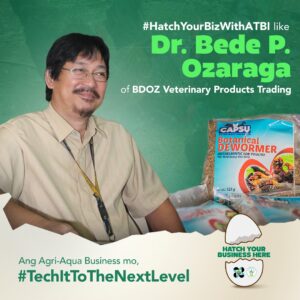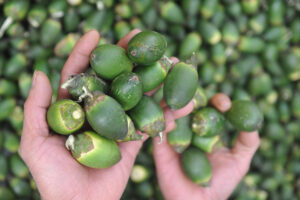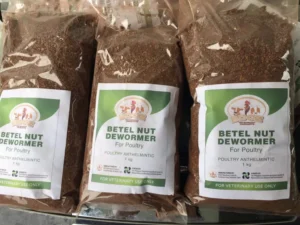Capiz vet discovers a cutting-edge organic deworming treatment to aid poultry raisers

PROVINCE OF CAPIZ, Philippines — Dr. Bede P. Ozaraga, a veterinary medicine doctor and owner of a spinoff company behind the country’s first organic dewormer that can treat internal parasitism for chicken, has always been motivated to assist farmers and livestock raisers in increasing their profit by engaging them in holistic, adaptable, and relevant support.
His vast experience in animal science and management of domestic livestock paved the way for him to detect the prevalence of internal parasitism in native chickens in Western Visayas. One of his observations is that most livestock owners and raisers in Capiz and its neighboring provinces heavily rely on chemical-based dewormers. According to him, this led to the occurrence of drug resistance which means that the parasites are not killed but continue to deprive chickens of nutrients that they need.
In a qualitative pilot study on antimicrobials used in the backyard and commercial poultry and swine farms in the Philippines (Barroga et al., 2020), 98.1% of the research locale (representative provinces from the Luzon and Visayas group of islands) experience a high prevalence of drug resistance, especially on retail chickens. For resource-scarce countries like the Philippines, strict implementation of standards for veterinary medical products (VMPs) and their enforcement remain to be flawed. Farmers and livestock raisers can easily access and purchase VMPs in local agrovet stores and outlets without having to secure first a prescription from a veterinarian.
“Veterinarians have to be at the forefront of advocating for the prudent use of veterinary medical products like the treatment of roundworms in chickens. We are being challenged to deviate from entirely relying on commercial dewormers as it is not only futile but also a recipe for disaster —widespread occurrence of drug resistance among livestock,” Dr. Ozaraga said during the interview via zoom.
“We have developed the use of ethnobotanicals that are available in the locality. Its utilization can reduce the parasitic burden to tolerable levels, particularly on free-range native chickens,” he added.

Photo by: Brigido LaGuardia
Dr. Ozaraga worked closely with his colleagues from Capiz State University-Dumarao Campus, in developing their ethnobotanical dewormer for free-range chickens after countless studies, trials, and testing.
The dewormer is consisting of processed seeds of betel nut (Areca catechu) or bunga in their local dialect. Traditionally, bunga is used in a popular custom called nganga (betel chewing). This goes with betel leaf, slaked lime, and may sometimes contain tobacco. While the origin of this tradition is still unknown to date, this chewing tradition is most prevalent in agrarian communities in the Philippines and in Southeast Asia. Who would have thought this raw material can also be used to treat infections of animals with parasitic worms apart from its social affability use in many communities in the country?
This Botanical Dewormer has been scientifically prepared to help reduce and eliminate intestinal worms in chickens. Its active ingredients such as arecoline, recaidine, and guvacine target the enemy (gamma-aminobutyric acid) by causing paralysis and the eventual death of parasitic worms.
In 2013, Dr. Ozaraga and his team’s innovation led to their successful win of the Regional Likha Award organized and sponsored by the Department of Science and Technology (DOST) and the Technology Promotion and Application Institute (TAPI). In 2014, the said innovation bagged the 2nd place for the Best Development Paper Award in the National Symposium on Agriculture, Aquatic and Natural Resources Research and Development (NSAARRD) sponsored by DOST’s Philippine Council for Agriculture, Aquatic and Natural Resources Research and Development (DOST-PCAARRD). Four years later, the same discovery was recognized by the Civil Service Commission (CSC) in its annual Pag-asa Award. Their innovation was also referenced a few times as a notable scholarly research work.

Additionally, the ethnobotanical dewormer for poultry was officially recognized and registered by the Intellectual Property Office of the Philippines (IPO-PHL) in 2012. Three years after, another ten (10) compositions and processes of botanical dewormers made by the team were also recognized and registered by the IPO-PHL. This highly coveted recognition protects the innovation made by Dr. Ozaraga and at the same time provides an economic benefit for him and his team.
Veterinarians and animal science practitioners like Dr. Ozaraga play an important role in animal health, public health, research, food safety, and sustainability. They spend a significant amount of time and effort in finding new ways to treat and diagnose health-related problems in animals, hence contributing to public health. Their recent discoveries that helped control parasitic worm infestation in poultry farms is considered a refinement of how veterinary medicine protects the health of the animal and the people.
At a time when we lack the presence of veterinarians, para veterinarians, animal science technicians, and other allied professionals in the rural areas, we are being urged to support and aid our farmers in the demands of this day and age. As Agriculture 5.0 is just around the corner, we need to galvanize the nation’s strength in terms of utilizing modern technological solutions and innovations that can mitigate risks and increase productivity and profit which will then improve the lives of Filipino farmers and livestock raisers, especially in underserved communities.
The Betel Nut Dewormer is manufactured and distributed by BDOZ Veterinary Products Trading, a startup enterprise based in Poblacion Ilaya, Dumarao, Capiz, Western Visayas. BDOZ is one of the mentees of the LIPAD Project Batch 1 (Levelling-Up of Innovative Agriculture, Aquatic, and Natural Resources-based Startups/Spinoffs thru Promotion, Assistance, and Development Project). The said initiative aims to provide mentorship and other intervention measures to selected AANR-based startups/spinoffs in the country. The project is being implemented by the Department of Science and Technology-Philippine Council for Agriculture, Aquatic, and Natural Resources Research and Development (DOST PCAARRD), in partnership with the University of the Philippines Institute for Small-Scale Industries (UP ISSI).
#ISSISupportsMSMEs
Disclaimer: The views expressed herein or in any article in the UP ISSI website are those of the authors and do not necessarily reflect the policies or opinions of UP ISSI nor the views of the University of the Philippines. Regarding Accuracy of Information and Usage of Data: Visitors and users of the UP ISSI website are advised that information contained within the website is assumed to be accurate. However, errors can occur even with computer-generated information. UP ISSI makes no representation regarding the completeness, accuracy, or timeliness of such information and data, or that such information and data will be error-free. Visitors are encouraged to review the official version of all documents on which they plan to rely on.
Wow Congatulations Doc Bede and Team!!!